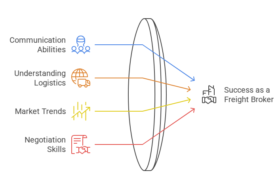In the fast-paced world of logistics and transportation, freight brokers play a crucial role in connecting shippers with carriers and ensuring the smooth movement of goods from point A to point B. If you are considering a career in the logistics industry or looking to enhance your existing skills as a freight broker, you’ve come to the right place. In this comprehensive guide, we will delve deep into the world of freight broker training, providing you with valuable insights, expert tips, and the essential knowledge to excel in this exciting and rewarding field.
1. Understanding the Role of a Freight Broker
Before we dive into the intricacies of freight broker training, it’s essential to grasp the fundamental role of a freight broker. A freight broker acts as an intermediary between shippers (individuals or businesses with cargo to transport) and carriers (truck drivers, shipping companies, or other transportation providers). Their primary responsibility is to match the shipping needs of the shippers with the available capacity of carriers, ensuring timely and cost-effective transportation of goods.
2. The Importance of Freight Broker Training
Becoming a successful freight broker requires a diverse skill set and in-depth industry knowledge. Freight broker training equips individuals with the necessary expertise to navigate the complexities of the logistics industry, build strong relationships with both shippers and carriers, negotiate effectively, and comply with legal and regulatory requirements.
3. Key Components of Freight Broker Training
a. Freight Industry Fundamentals
In the initial stages of training, it’s vital to grasp the foundational knowledge of the freight industry. This includes understanding the various modes of transportation, freight classifications, and the role of technology in streamlining logistics operations.
b. Legal and Regulatory Compliance
Compliance with industry regulations and legal requirements is a critical aspect of freight brokerage. Training should cover topics such as obtaining the necessary licenses, permits, and insurance, as well as understanding contracts and liability issues.
c. Sales and Marketing Skills
Effective sales and marketing strategies are essential for attracting both shippers and carriers. Training programs should focus on developing persuasive communication skills, lead generation, and nurturing long-term business relationships.
d. Negotiation Techniques
As a freight broker, your ability to negotiate favorable terms for your clients is paramount. Training should encompass various negotiation techniques, handling objections, and securing competitive rates for shipping services.
e. Freight Documentation and Record Keeping
Proper documentation and record-keeping are crucial for efficient freight brokerage operations. Training should cover essential paperwork, invoicing procedures, and the use of technology for seamless documentation management.
f. Risk Management and Problem Solving
The logistics industry is not without its challenges. Freight broker training should address risk management strategies and equip brokers with problem-solving skills to handle unforeseen situations and emergencies effectively.
4. Choosing the Right Program
With the growing demand for freight brokers, several training programs are available in the market. To ensure you receive top-notch training, consider the following factors when choosing a program:
a. Accreditation and Reputation
Look for training programs accredited by reputable organizations or industry associations. Read reviews and testimonials from past participants to gauge the program’s effectiveness.
b. Comprehensive Curriculum
A robust freight broker training program should cover all the key components mentioned earlier and provide real-world case studies and practical exercises.
c. Experienced Instructors
Experienced instructors with a background in freight brokerage can offer invaluable insights and guidance throughout the training process.
d. Placement Assistance
Some training programs may offer placement assistance to help kickstart your career as a freight broker.
5. Advancing Your Freight Broker Career
After completing your initial freight broker training, the learning journey doesn’t end there. Continuous professional development and staying updated with industry trends and regulations are essential for long-term success. Attend industry conferences, workshops, and webinars, and consider pursuing advanced certifications to stand out in a competitive market.
Conclusion
Freight broker training is a gateway to a promising and dynamic career in the logistics industry. By investing in comprehensive training, honing essential skills, and staying dedicated to continuous improvement, you can position yourself as a reliable and sought-after freight broker in the market.







